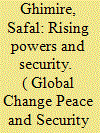| Srl | Item |
| 1 |
ID:
152802


|
|
|
|
|
| Summary/Abstract |
UK policies embrace the ideas of security–development nexus, but most scholarship on its engagement builds upon African cases. This paper examines the drivers, nature and implications of UK involvement with an Asian country, Nepal. The UK’s position as the largest bilateral contributor and major peace and security donor among at least 21 others makes examination of its Nepal involvement imperative. This paper uses the grounded theory method and interpretivist analytical approach to create interactions between published and field information. Although the UK’s persistent engagement and programme-based approach helped peacefully manage transition, this paper contends, institutional changes have been shallow and winning confidence remains strenuous
|
|
|
|
|
|
|
|
|
|
|
|
|
|
|
|
| 2 |
ID:
161327


|
|
|
|
|
| Summary/Abstract |
Interactions of rising powers and established powers and their implications in peacebuilding and security remain underexplored in existing literature. This paper aims to explore inferences of the behaviour of Brazil, China and India in peacebuilding and security, their contention and cooperation with the US and European powers, and implications for the global south. It analyses their interactions in the light of democratic peace propositions, adhered to by established powers, and the regional security complex theory pertinent to the ascendancy of new powers. Though liberal countries are co-opting emerging actors, the responses of rising powers to international security issues appear inconsistent and unpredictable. With increasing material capabilities, rising powers have been creating a patron–client relationship with conflict-affected states, because of which this article disconfirms possibilities of a sometimes anticipated pro-south world order.
|
|
|
|
|
|
|
|
|
|
|
|
|
|
|
|